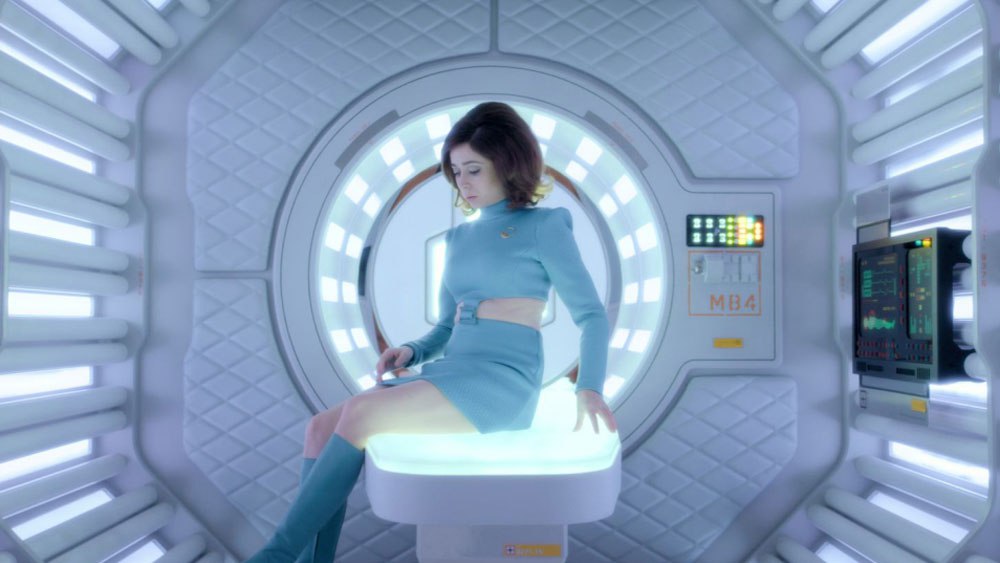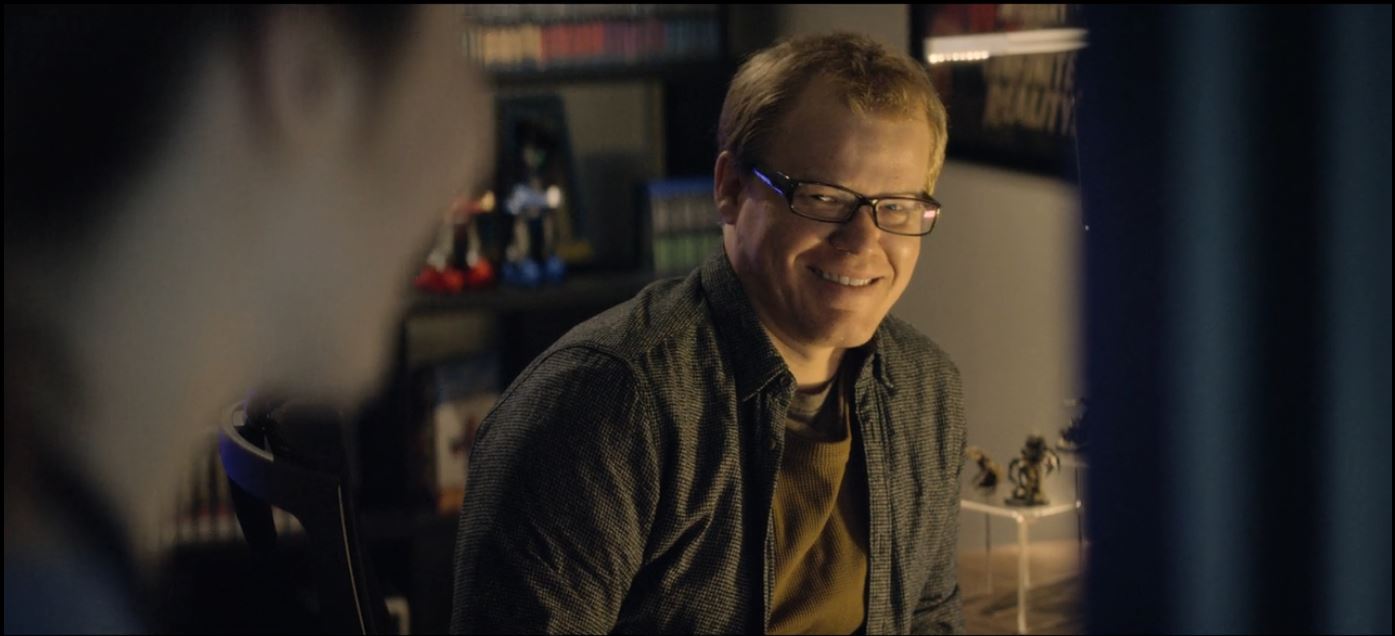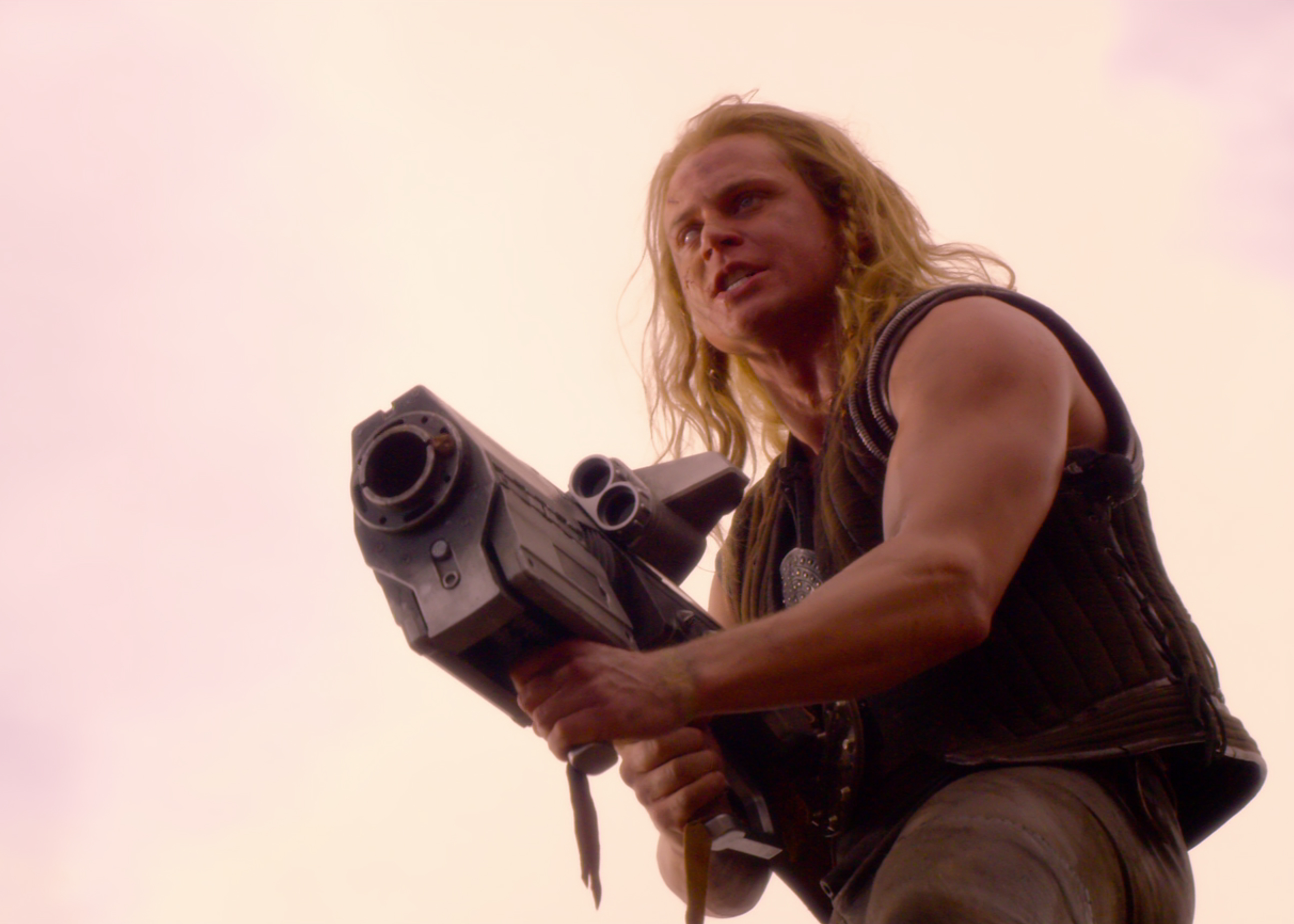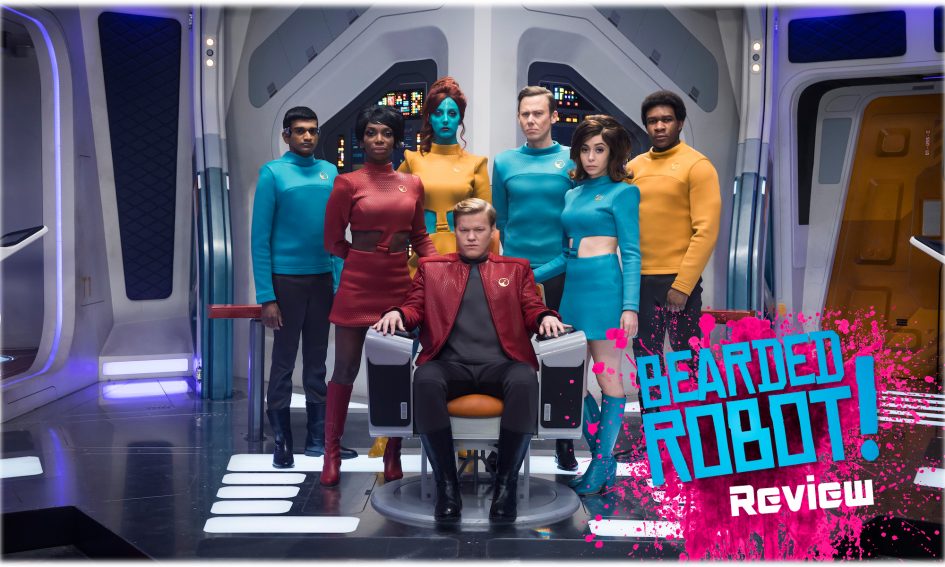**Black Mirror Season 4 Episode 1 Spoilers**
Black Mirror over the years has treated us to some excellent TV, sometimes falling along the lines of intended cliche, moral dilemmas, horror and in USS Callister’s case, empathy. Empathy will be something I discuss a lot in this review as it’s something which really intrigues me, the idea that uncontrolled revenge can often be worse than what the victim has actually been through themselves. That’s where conflict of emotions comes into play, which we’ll get into. Something like I Spit On Your Grave or Kill Bill is an example of a lead character who is treated disgustingly through one means or another and exacts revenge after they’ve hit their lowest point. Rooting for the underdog once they’ve been at the mercy of their torturer in a physical of mental sense is empowering for the viewer and good to watch, as we see the villains of the piece get their comeuppance, but where do we draw the line?
Referencing I Spit On Your Grave again, we see the lead character go through a terrible and traumatic experience and we hate the villains so much that watching unfathomable things happen to them is actually satisfying, which is surely messed up, or is it? Hatred and jealously is a natural emotion for a human to experience and we’re all forgiven for feeling it once and a while; and whilst I say it’s natural, acting on it is where our common sense comes into play. Just because we hate somebody or somebody wrongs us, it doesn’t mean we have the right to beat them up or worse, and the repercussions of this would be astronomical even if we were angered enough to act on these emotions. We have what I like to think of as a firewall in our brains which restricts (most) of us from doing insane things. We’ve all had that experience where we’ve stood on a high cliff or looked over a balcony and thought “If I wanted to I could just jump off this” and of course we don’t because that would be insane. Or just somebody’s done something to hurt one of our family members, or wrong us in some way, we’re not going to go “end them” for God’s sake! The firewall stops us due to the repercussions or compassion we feel as humans. USS Callister explores somebody who is absolutely broken and slightly unhinged mentally who does act on these feelings and whilst some films like the aforementioned, have you rooting for the underdog, episode 1 season 4 of Black Mirror, really doesn’t.

The first episode of the fourth series, written by Charlie Brooker and William Bridges and directed by Toby Haynes gives us a taste of how it feels to sympathise with a monster, whilst also rooting for his puppets. This isn’t uncommon in modern day TV and film (Game of Thrones does it amazingly), but what USS Callister does best is conflict your reasoning and empathy towards every character in the show. We follow the lead character Robert Daly, an expert coder who has dedicated his life and career to creating a giant gaming MMO (Massively multiplayer online game) which sees people enter a fully immersive VR gaming platform where they can completely lose themselves in a reality skinned to their choice. Unfortunately we don’t get to see much of this game in action, as what we experience is Robert Daly’s offline version of the game, which he has modded, himself. We’ll get into that shortly.
Robert Daly is a complex character and as with most people who struggle socially, whilst he’s great at what he does, he’s not quite there in terms of leading people and running a business, so whilst he’s the brains of the outfit, his partner and co-founder Walton generally runs the show and is the face of the company, Infinity. Daly’s stumbling antics and awkwardness around his co-workers see them mock him on a regular basis and really makes you feel for the character. He wants to be loved and he wants to be respected, but he doesn’t have the fire in him that his partner Walton does, which cleverly convinces you is the reasoning behind why his character turns so dark. And when I say dark, it gets very dark. In his office environment, he’s a joke who people avoid, laugh at a talk about behind his back, so when he’s home his only real choice is to take himself out of his miserable reality and immerse himself into his own modded version of his game Infinity, skinned as his favourite old school TV Show, Space Fleet (a Star Trek homage, clearly).
By using a simple disk which attaches to the temple, you become unconscious and integrated into the game, but there’s always a link to the outside world, for example if you were to hear the telephone, door or somebody tapped you on the shoulder, the in-game version of your can simply pause the game and enter back into the real world. So it all seems pretty simple, but what Daly has also done is hook up a gadget which when given DNA to process, can clone and create a human replica, including consciousness and spit it out into his Space Fleet universe. There’s been a lot online about the science behind this, as clearly using DNA to clone something is not going to also copy over consciousness, but this is Black Mirror and sometimes you have to realise, that it’s less about the detail and more about the bigger picture, and that isn’t me glossing over it, it’s a fact which is also intended by the writers. Their message to the viewer is not about how to become the perfect science engineer, it’s more about the repercussions of what could happen if such science existed.

We mentioned Daly’s partner and co-founder Walton, who is a complete arse to him on daily basis (see what I did there?) and many other characters in the workplace are also either very dismissive of him, rude to him, or simply aren’t working hard enough for him; including company reps Shania and Valdack, receptionist Elena, intern Nate and computer whizz Kabir. What Daly does is use DNA from coffee cup samples and other weird means of acquisition and clones these people into his game where suddenly he has the power, he is God. He uses them to build back up his broken self-esteem by being the boss in this make-believe Space Fleet game. Here he’s leader and taunts them if they do something wrong or punishes them if they make a mistake, just like what happens to him in the real world. He only really does to them what they’ve done to him in real life, but it does end up spiralling out of control when he meets new employee Nanette Cole, a coder who is a massive fan of his work and really seems smitten by him. You get the feeling that Nanette is the first person in years who has treated him well and actually respects what he’s built, but when she meets Shania who warns her how much a creep Daly is, he hears the whole thing and it leads to Nanette isolating him and avoiding him like the others.
So what does Daly do? Coffee cup time. He uses her DNA and integrates a perfect clone of her into his game, which gains him control over her as with the others. It’s then that we find out that the ship crew in Daly’s Space Fleet game have been in there for years and also have consciousness. They remember their outside world and have come to terms over however many months and years, that they are just clones of their real life selves. They’ve learnt that Daly will punish them for not playing along with his little games and if they step out of line, the threat of not being part of his “play” is far worse. He uses torture techniques to make crew members suffer whilst not dying and promises eternal suffering to those who won’t play ball and Nanette finds this out he hard way in a few scenes including one where he removes her face leaving her gasping for air and threatens it to be never ending. There’s some dramatic irony that he knows all about his co-worker’s clones and their real life selves just go about their daily routine without ever knowing that he’s used their DNA to recreate them for his sick little out of office games and the invasion of privacy here is extreme.
Something else notable is that none of the clones have genitalia, which I found interesting as I thought his character was a little childish. His obsession with Space Fleet, his lack of ability to have an adult conversation. Even the scenarios he dreams up in his version of Infinity are a little childish, think back to “Look a naked lady”. There was never anything sexual or perverted about his intentions, let’s make that clear. It was always about power and control, which he has when he was in the game. Daly does however over step the mark quite a lot more and that’s when you see the real depth to how dark this character is. When he doesn’t have control, Daly flips and tortures the clones as mentioned but none more so than Walton, who recites a story to the rest of the crew about when he was first integrated into the game. Using DNA from real life Walton’s, real life son Tommy’s lollypop, he clones Tommy into his game and mentally tortures Walton but shooting the boy out into space and forcing Walton to watch. This was perhaps the darkest part of the episode, as we see poor Walton screaming helplessly as his son is obliterated by the pressure of being released into space. Daly threatens to do this to Walton as many times as it will take until he plays ball, and of course Walton does. Suddenly as the viewer, you feel that the line has been completely crossed by this point and are no longer rooting for underdog any more and more for the helpless clones who have been thrown into a torturous situation they’re unable to break away from.

Anyway, moving along, Nanette figures out a plan to escape through a wormhole which has been created by an update for the game. If they can make it through the wormhole before update is completed and the hole closes, they’ll leave the current old version of the game behind and be transported to somewhere else, or simply obliterated. Death at this point seems an amazing option to the entire crew as opposed to the endless games and torture at the hands of Daly. Nanette distracts Daly in-game and the crew communicate with the outside world using the device Daly uses to pause and exit the game. They succeed in this by blackmailing her real life self, threatening to release nudes from her iCloud if she doesn’t break into Daly’s house and steal the DNA he keeps in a mini-fridge next to his desk. Nanette knows her real self would do anything to stop hackers releasing these images and real life Nanette succeeds in doing this by calling a pizza to Daly’s door, which means he pauses the game and she’s able to sneak in the back and steal the DNA. It’s here we see a slightly douche bag side to real life Daly too, as he gets a free pizza but fails to tip the pizza guy, leaving a Do Not Disturb message on his door. He resumes game but the crew are already on course to the worm hole. Daly uses his transport ship to chase the crew down but is not quick enough to catch them as they escape. Daly is left in his in-game world as the wormhole closes and we realise that he was so hellbent in catching his crew that he failed to exit the game in time, for it to then be deleted completely and replaced by the new update. He screams “End Game” countless times but nothing happens, as his real life self lays limp and unconscious in his computer chair at home. We never find out what happens to Daly but it’s safe to assume there is a high possibility that he dies. We think back to the Do Not Disturb sign on his door, to the 10 day break the company has just started for Christmas and the fact we left to assume he’s a very lonely guy with no family or friends. He’s left at his computer with no food or water for 10 days and no way for his in-game self to release him from the game’s shackles. It’s a grim end to a very grim character.
Meanwhile the crew lead by Nanette end up in the new updated version of the game, where they encounter a real life player in Infinity who trash talks them before they escape. A bit of trivia, the gaming trash talker is actually Aaron Paul (Breaking Bad), which is a random but fun fact. We lead to believe that they continue to exist in their own little world (the newly updated game, Infinity) but no longer in the shackles of a madman and back in control of their own lives, all be it limited to the game itself.
Overall I really enjoyed USS Callister and it was a nice change to see the good guys win but more importantly got me thinking about empathy towards people. Like all Black Mirror episodes it helps give you a different perspective on certain things and I respect Charlie Brooker and his team immensely for consistently doing just that. I’ve said and done thing to people in the past which i regret and some things I’m not proud of and I’m sure some people feel the same about how they’ve treated me, it’s human nature. But what I will say is that I’m glad none of them is a super gaming coder who has the ability to clone me and torture me in their sick and twisted little game… or have they? Or have I?



10th January 2018 at 08:46
buying cialis in germany
[url=http://cialispurchaseq.com/]buy cialis[/url]
online cialis
vendo cialis domicili
11th January 2018 at 10:53
My spouse and I absolutely love your blog and find a lot of your post’s to be just what I’m looking for. Do you offer guest writers to write content for you personally? I wouldn’t mind publishing a post or elaborating on most of the subjects you write concerning here. Again, awesome web log!
29th January 2018 at 09:06
Ewvj1W Wow, superb blog layout! How long have you been blogging for? you make blogging look easy. The overall look of your website is great, let alone the content!. Thanks For Your article about sex.
31st January 2018 at 10:18
On the outside its measures are an even dozen point-five inches in diameter on six point-five toaster oven reviews centimeters heavy.
31st January 2018 at 11:02
Very neat blog.Thanks Again. Great.
31st January 2018 at 12:48
Awesome blog post.Thanks Again. Great.
31st January 2018 at 16:13
Thanks for sharing, this is a fantastic blog article.Much thanks again. Awesome.
31st January 2018 at 16:40
Wow, superb blog layout! How long have you been blogging for? you make blogging look easy. The overall look of your site is great, as well as the content!
31st January 2018 at 19:40
Really informative article.Really looking forward to read more. Really Cool.
31st January 2018 at 20:56
tiffany rings Secure Document Storage Advantages | West Coast Archives
31st January 2018 at 21:40
I would like to point out my respect for your kindness giving support to people who really need assistance with this particular subject. Your real commitment to passing the message all-around was remarkably valuable and have truly made most people like me to arrive at their goals. Your entire warm and friendly facts entails much to me and even more to my mates. Thanks a lot; from each one of us.
31st January 2018 at 23:07
I truly appreciate this article.Much thanks again. Fantastic.
1st February 2018 at 00:51
A big thank you for your article post.Really looking forward to read more. Great.
1st February 2018 at 01:17
Wow, great article.Thanks Again. Will read on
1st February 2018 at 02:38
Great, thanks for sharing this blog post.Really looking forward to read more. Cool.
1st February 2018 at 03:28
This is my first time go to see at here and i am really pleassant to read all at alone place.
1st February 2018 at 03:36
how to order generic viagra
buy generic viagra
buy generic viagra cheap
1st February 2018 at 04:25
A big thank you for your blog article.Much thanks again. Want more.
1st February 2018 at 07:52
Really informative article post.Really looking forward to read more. Will read on
1st February 2018 at 07:57
Major thanks for the article.Really thank you! Really Cool.
1st February 2018 at 10:08
viagra buy online generic
viagra without a doctor’s prescription
buy generic viagra online overnight
1st February 2018 at 11:08
Great, thanks for sharing this article. Cool.
1st February 2018 at 17:46
It’аs truly a nice and useful piece of information. I’аm satisfied that you shared this helpful information with us. Please stay us up to date like this. Thank you for sharing.
1st February 2018 at 20:03
You made some clear points there. I did a search on the subject and found most guys will approve with your site.
1st February 2018 at 22:20
Very good article post.Really looking forward to read more. Cool.
2nd February 2018 at 00:38
I value the article.Thanks Again. Will read on
2nd February 2018 at 02:55
Some really fantastic content on this website , thanks for contribution.
2nd February 2018 at 05:12
Some genuinely nice and utilitarian info on this website , besides I think the design and style contains fantastic features.
2nd February 2018 at 18:24
Way cool! Some very valid points! I appreciate you writing this article plus the rest of the site is really good.
3rd February 2018 at 01:00
we like to honor several other net internet sites around the web, even though they aren
3rd February 2018 at 03:20
I really liked your blog post.Much thanks again. Really Cool.
3rd February 2018 at 05:41
I simply want to say I am new to blogging and actually savored your web site. More than likely I am going to bookmark your site. You surely have wonderful writings. Regards for revealing your blog.
3rd February 2018 at 08:01
I value the blog article.Really thank you! Keep writing.
3rd February 2018 at 10:19
This site definitely has all the information I wanted about this
3rd February 2018 at 10:28
will leave out your wonderful writing because of this problem.
3rd February 2018 at 12:37
Thank you for your blog post. Really Cool.
4th February 2018 at 11:16
Really appreciate you sharing this blog post. Fantastic.
4th February 2018 at 11:29
You made some really good points there. I checked on the net to learn more about the issue and found most people will go along with your views on this site.
4th February 2018 at 13:08
Hey, thanks for the article.Really looking forward to read more. Keep writing.
4th February 2018 at 13:50
Wow! Thank you! I constantly wanted to write on my site something like that. Can I implement a portion of your post to my site?
4th February 2018 at 15:00
Thanks for the article post.Thanks Again. Awesome.
4th February 2018 at 16:10
This blog is definitely entertaining additionally diverting. I have discovered helluva handy things out of this amazing blog. I ad love to return every once in a while. Thanks!
4th February 2018 at 16:52
Fantastic blog post. Really Great.
4th February 2018 at 18:32
This is really interesting, You are a very skilled blogger. I have joined your feed and look forward to seeking more of your excellent post. Also, I have shared your site in my social networks!
4th February 2018 at 20:56
It as really very complex in this active life to listen news on Television, thus
5th February 2018 at 17:19
A round of applause for your post.Really looking forward to read more. Really Great.
5th February 2018 at 21:09
Awesome blog.Thanks Again. Cool.
5th February 2018 at 22:13
Major thanks for the post.Much thanks again.
6th February 2018 at 00:37
Thanks again for the post.Thanks Again. Keep writing.
6th February 2018 at 03:01
Fantastic article.Much thanks again. Awesome.
6th February 2018 at 03:02
Some truly choice articles on this website , saved to favorites.
6th February 2018 at 04:59
I really like and appreciate your blog post.Really thank you! Fantastic.
6th February 2018 at 05:27
My brother suggested I might like this website. He was totally right. This post truly made my day. You can not imagine simply how much time I had spent for this info! Thanks!
6th February 2018 at 06:59
Thanks for the blog article.Really looking forward to read more. Will read on…
6th February 2018 at 07:51
I really liked your blog post.Really looking forward to read more. Keep writing.
6th February 2018 at 08:55
I appreciate you sharing this blog.Really thank you! Really Great.
6th February 2018 at 10:54
Really enjoyed this article.Thanks Again. Much obliged.
6th February 2018 at 12:51
Awesome article.Much thanks again. Cool.
6th February 2018 at 15:01
Just what I was looking for, thanks for putting up.
6th February 2018 at 16:46
Thanks a lot for the article. Really Great.
6th February 2018 at 17:22
Im thankful for the article. Really Cool.
6th February 2018 at 20:40
Very neat blog post.Much thanks again. Fantastic.
6th February 2018 at 22:39
I think this is a real great blog.Really looking forward to read more. Really Great.
7th February 2018 at 00:37
It as not that I want to copy your internet site, but I really like the design. Could you tell me which theme are you using? Or was it especially designed?
7th February 2018 at 00:38
Really appreciate you sharing this post.Really thank you! Great.
7th February 2018 at 03:02
Thanks you\аЂ аЂаBuy Generic Viagra\аЂ аЂа.
7th February 2018 at 04:35
List of Safe Online Pharmacies
сanada pharmacy
lloyds pharmacy online
7th February 2018 at 04:42
Very good blog article.Much thanks again. Great.
7th February 2018 at 08:42
Great article.Really thank you! Really Cool.
7th February 2018 at 11:47
Very informative post.Much thanks again. Keep writing.
7th February 2018 at 12:07
Some really great articles on this web site , appreciate it for contribution.